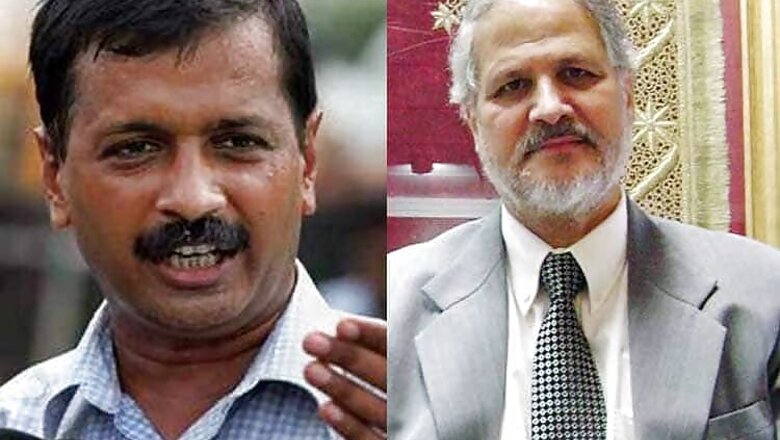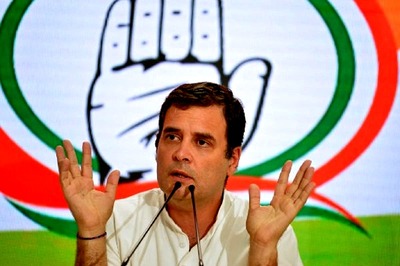
views
With neither Delhi Chief Minister Arvind Kejriwal not Lieutenant Governor Najeeb Jung backing off from their stand on appointment of bureaucrats to key positions, the National Capital Territory of Delhi is facing a constitutional crisis.
Even though the NCT of Delhi is a Union Territory, it has an elected legislature. Hence the state Assembly has the right to legislate on all subjects except land and law and order but if there is a conflict with Parliament, then the will of the latter prevails.
Kejriwal maintains that even though Delhi is not a full-fledged state, his government has the right to appoint officers of its choice to key positions whereas Jung maintains that he has the powers to make appointments without consulting the elected government.
The two sides have been at loggerheads for several days resulting in unease in the bureaucracy. The crisis started when Jung appointed senior Indian Administrative Officer (IAS) Shakuntala Gamlin as action Chief Secretary of Delhi without consulting the Aam Aadmi Party government.
Kejriwal and his ministers hit back at Jung immediately and accused him of playing politics in connivance with the Centre to destabilise the AAP government. Both sides have also dragged President Pranab Mukherjee into the controversy.
Jung met the President on Tuesday afternoon to apprise him about the situation while Kejriwal and Delhi Deputy Chief Minister Manish Sisodia held consultation with him in the evening.
But what are exactly the provisions in the Constitution related to Delhi and who has the powers to appoint officers? Under the Constitution provisions related to Delhi are listed under Part VIII which deals with the Union Territories. The special provisions with respect to Delhi are listed under Article 239AA, 239AB, 239B.
The confusion over the exact divisions of power and responsibilities are compounded by another provision called Transaction of Business of the Government of National Capital Territory of Delhi Rules, 1993. In the Transaction of Business Rules, too, the powers of the Delhi government and Lieutenant Governor are defined.
But the confusion also arises from the different interpretation of the Transaction of Business Rules. While the Lieutenant Governor has the powers to take a decision, the rules state that he/she must consult the Council of Ministers if there is a difference of opinion between the Lieutenant Governor and a Minister.
Below are the details of the Article of Constitution which are relevant to the present crisis:
239AA. Special provisions with respect to Delhi.—(1) As from the date of commencement of the Constitution (Sixty-ninth Amendment) Act, 1991, the Union territory of Delhi shall be called the National Capital Territory of Delhi (hereafter in this Part referred to as the National Capital Territory) and the administrator thereof appointed under article 239 shall be designated as the Lieutenant Governor.
(4) There shall be a Council of Ministers consisting of not more than ten per cent of the total number of members in the Legislative Assembly, with the Chief Minister at the head to aid and advise the Lieutenant Governor in the exercise of his functions in relation to matters with respect to which the Legislative Assembly has power to make laws, except in so far as he is, by or under any law, required to act in his discretion:
Provided that in the case of difference of opinion between the Lieutenant Governor and his Ministers on any matter, the Lieutenant Governor shall refer it to the President for decision and act according to the decision given thereon by the President and pending such decision it shall be competent for the Lieutenant Governor in any case where the matter, in his opinion, is so urgent that it is necessary for him to take immediate action, to take such action or to give such direction in the matter as he deems necessary.
(5) The Chief Minister shall be appointed by the President and other Ministers shall be appointed by the President on the advice of the Chief Minister and the Ministers shall hold office during the pleasure of the President.
(6) The Council of Ministers shall be collectively responsible to the Legislative Assembly.
(7) (a) Parliament may, by law, make provisions for giving effect to, or supplementing the provisions contained in the foregoing clauses and for all matters incidental or consequential thereto.
(b) Any such law as is referred to in sub-clause (a) shall not be deemed to be an amendment of this Constitution for the purposes of article 368 notwithstanding that it contains any provision which amends or has the effect of amending, this Constitution.
(8) The provisions of article 239B shall, so far as may be, apply in relation to the National Capital Territory, the Lieutenant Governor and the Legislative Assembly, as they apply in relation to the Union territory of Puducherry, the administrator and its Legislature, respectively; and any reference in that article to “clause (1) of article 239A" shall be deemed to be a reference to this article or article 239AB, as the case may be.
Below are the details of the Transaction of Business Rules which are relevant to the present crisis:
Under Chapter IV of the Transaction of Business Rules titled Disposal of business relating to Lieutenant Governor's Executive Functions
45. The Lieutenant Governor, may by standing orders in writing, regulate the transaction and disposal of the business relating to his executive functions:
Provided that the standing orders shall be consistent with the provisions of this Chapter, Chapter V and the instructions issued by the Central Government for time to time.
Provided further that the Lieutenant Governor shall in respect of matters connected with 'public order', 'police' and 'land' exercise his executive functions to the extent delegated to him by the President in consultation with the Chief Minister, if it is so provided under any order issued by the President under article 239 of the Constitution.
Provided further that 'standing orders' shall not be inconsistent with the rules concerning transaction of business.
46. (1) With respect to persons serving in connection with the administration of the National Capital Territory, the Lieutenant Governor shall, exercise such powers and perform such functions as may be entrusted to him under the provisions of the rules and orders regulating the conditions of service of such persons or by any other order of the President in consultation with the Chief Minister, if it is so provided under any order issued by the President under article 239 of the Constitution.
(2) Notwithstanding anything contained in sub-rule (1) the Lieutenant Governor shall consult the Union Public Service Commission on all matters on which the Commission is required to be consulted under clause(3) of article 320 of the Constitution; and in every such case he shall not make any order otherwise than in accordance with the advice of the Union Public Services Commission unless authorised to do so by the Central Government.
(3) All correspondence with Union Public Service Commission and the Central Government regarding recruitment and conditions of service of persons serving in connection with the administration of National Capital Territory shall be conducted by the Chief Secretary or Secretary of the Department concerned under the direction of the Lieutenant Governor.
47. The matter in respect of which no specific provision has been made in these rules, the Lieutenant Governor shall consult the Central Government before exercising his powers or discharging his functions in respect of that matter.



















Comments
0 comment